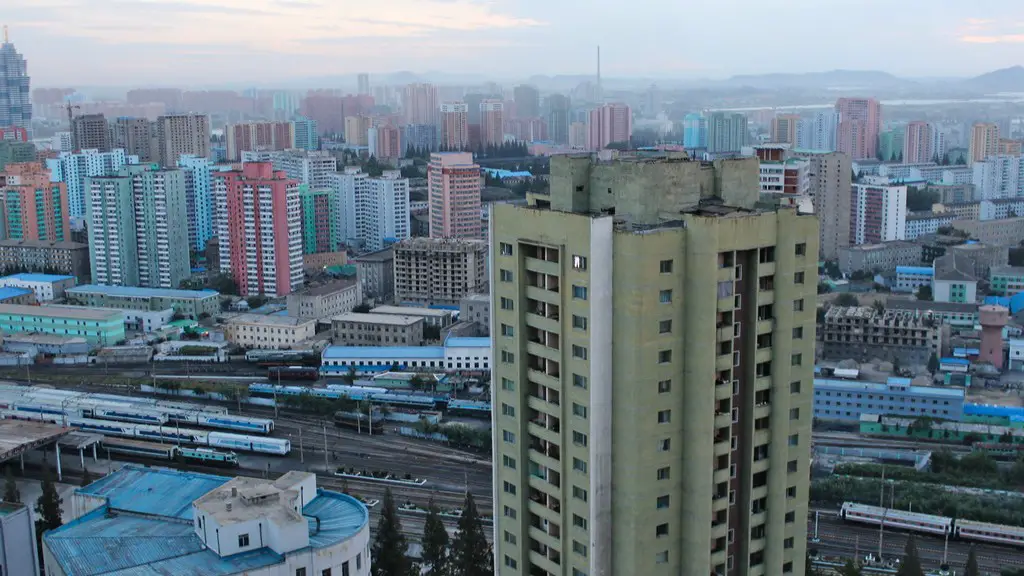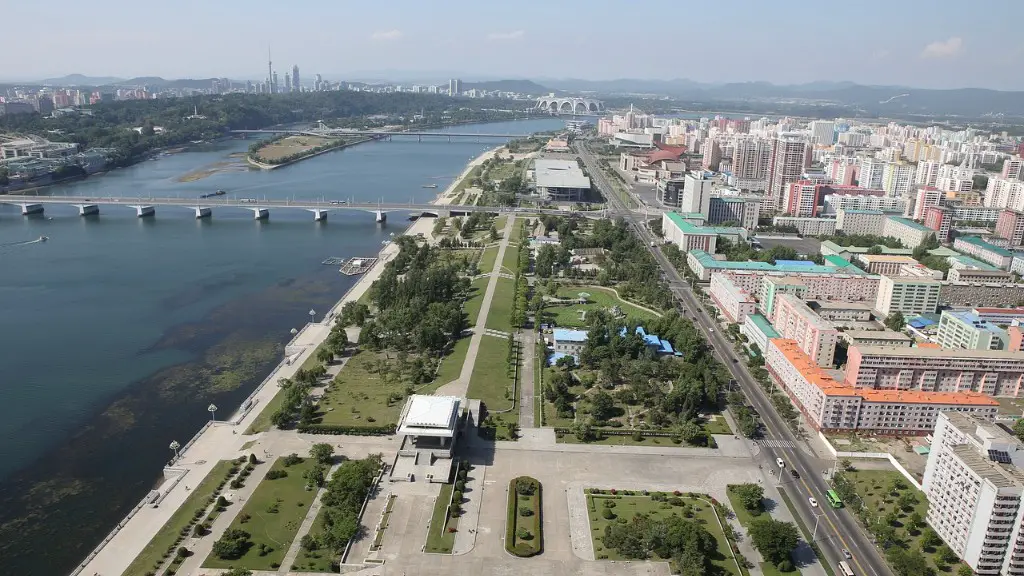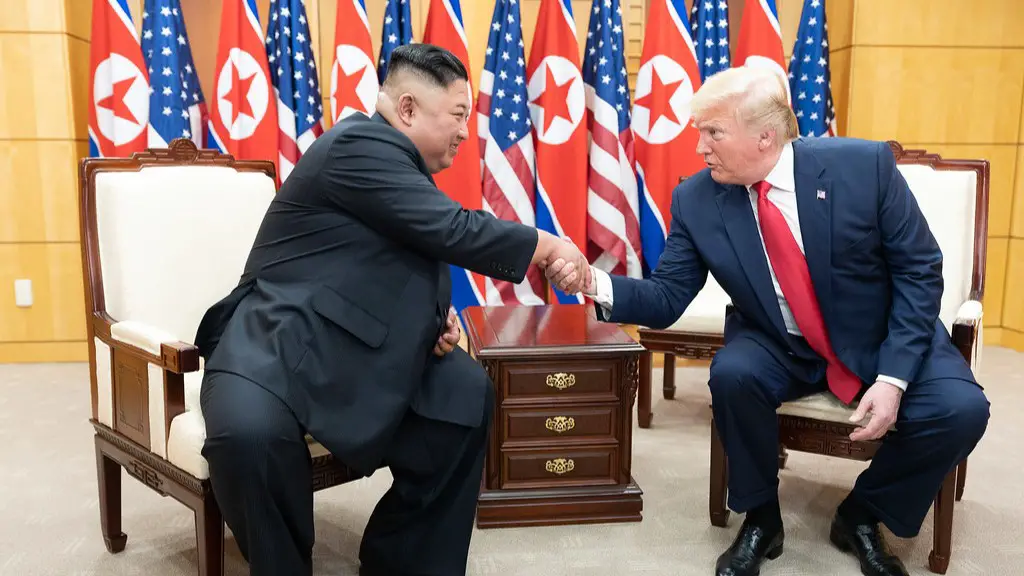For decades, the United States and North Korea have had a fractious relationship. To understand why they have become adversaries requires looking at the political, economic, and historical context in which they interact.
Since the Korean War in the early 1950s, North Korea has viewed the US as a hostile, imperialist state. This view has hardened over the years due to North Korea’s nuclear weapons program and US-led sanctions that have limited North Korea’s access to the global economy.
North Korea also sees US military forces stationed in South Korea, Japan, and other parts of Asia as a threat, believing these forces could be used to invade at any time and topple the North Korean government. In response, North Korea has adopted an aggressive stance, displaying its military power and developing a nuclear weapons program to serve as a deterrent against the US and its allies in the region.
The US, for its part, maintains that its presence in the region is a defensive one, meant to protect its allies and discourage further North Korean aggression. The US also accuses North Korea of human rights abuses and other provocations.
The two countries have long been at odds, but tensions have risen significantly in recent years. In 2017, North Korea conducted its most powerful nuclear test to date, prompting condemnation from the US. The following year,North Korean leader Kim Jong-un and President Donald Trump agreed to start negotiations to reduce tensions between their countries. Despite several meetings, the talks stalled, with the US accusing North Korea of acting intransigently and North Korea accusing the US of not taking its demands seriously.
The US has been clear about its stance on North Korea’s nuclear ambitions: only complete, verifiable, and irreversible denuclearization will be considered a satisfactory conclusion to negotiations. North Korea, however, has resisted US demands, viewing them as too demanding for a small, economically weak country.
In recent years, North Korea has become increasingly belligerent toward the US, launching missiles and testing nuclear bombs in defiance of international sanctions. Still, many analysts believe that a diplomatic solution is possible, as both sides have an interest in reducing tensions in the region and avoiding a nuclear conflict.
US Economic Sanctions
Economic sanctions imposed by the US have been among the most visible components of its foreign policy towards North Korea. These sanctions target North Korea’s banking and energy sectors, as well as its officials, businesspeople and institutions. The goal of the sanctions is to put economic pressure on North Korea in order to force the government to curtail its nuclear weapons program.
North Korea has denounced the US sanctions, arguing that they are an attempt to destabilize the country and overthrow its government. In response, North Korea has threatened further military action and increased its missile tests as a show of strength and defiance.
The impact of the US sanctions on North Korea has been intensifying in recent years, as new sanctions are continually imposed on the country. The US has also targeted North Korean companies in China, who offer critical supplies for the North Korean economy.
These sanctions have caused severe hardships for North Koreans, as access to basic necessities such as food and fuel are hampered by the economic pressure. This has only reinforced North Korea’s hostile stance towards the US, as the government and citizens alike see the US as the source of their economic hardship.
The Failures Of Negotiations
The US and North Korea have gone through several rounds of negotiations in recent years, but have yet to reach an agreement that would defuse the tensions between the two countries.
The main sticking point in the talks is North Korea’s nuclear weapons program. The US has demanded that North Korea dismantle its nuclear weapons and its nuclear infrastructure, while North Korea has insisted that the US must offer concessions in exchange.
The US has refused to make any concessions, arguing that its demands are non-negotiable. North Korea, meanwhile, has warned that if the US does not back down from its demands, it will take further military action.
The stalemate between the two sides has left the region on edge and has served to further reduce the trust between the two countries. As a result, there is little hope that the negotiations will yield any significant progress in the near future.
North Korea’s Hereditary Leadership
A major factor in the strained relationship between the US and North Korea is the country’s hereditary leadership system. North Korea is ruled by Kim Jong-un, son of previous leader Kim Jong-il, and grandson of North Korea’s original leader Kim Il-sung.
The North Korean leadership views the US as a threat to its rule, and as such maintains a hostile stance towards the US. Kim Jong-un has gone as far as to say that the US is “the enemy of the Korean people” and the “root cause of all evil”.
The Kim family has long been critical of the US, and is determined to preserve its rule by maintaining a strong anti-US stance. This has complicated the already difficult negotiations between the two countries, as North Korea’s insistence on maintaining a hostile attitude towards the US makes it difficult for the US to bridge the divide.
Role Of China
China has long been regarded as an important player in the North Korean issue, as it is the country’s closest ally and provides it with both economic and diplomatic support. In recent years, China has sought to use its influence over North Korea to temper its actions and encourage it to enter negotiations with the US.
At the same time, China has also opposed US sanctions, arguing that they do not serve the goal of de-escalating tensions and instead only serve to alienate North Korea further. China has instead proposed a “dual-track” approach that combines both sanctions and negotiations in order to find a diplomatic solution to the dispute.
Though China has remained a strong supporter of North Korea in recent years, its relationship with the US has become increasingly strained. This has hindered China’s ability to act as a mediator between the US and North Korea, as the two countries are unable to agree on any meaningful compromise.
Regional Impact Of US-North Korea Rivalry
The conflict between the US and North Korea has had a significant impact on the region, as the two countries have a long history of aggression and hostility that has strained relations between them and their neighbors.
For example, US-North Korea tensions have caused regional powers such as China and Japan to become increasingly wary of North Korea’s military capabilities. This has caused these countries to pursue their own military programs in the region, leading to further militarization of the area and further increased tensions.
The conflict has also unnerved US allies in the region, who have had to contend with the growing threat of North Korea’s nuclear program. This has led them to defer more to US military protection, putting pressure on the US to take a more active role in the region.
The prolonged conflict between the US and North Korea has also hindered development in the region, as private businesses have become increasingly reluctant to invest in the area due to the uncertainty of the situation. This has led to economic stagnation and worsening poverty in the area, further exacerbating the tensions between the two countries.





